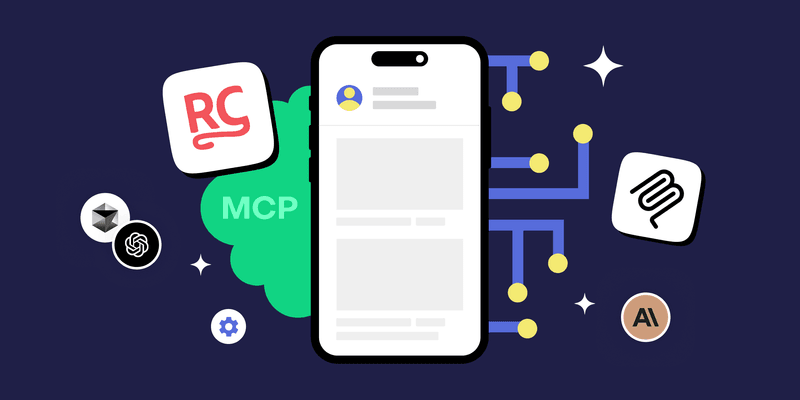Today, we’re launching the RevenueCat MCP Server, now in public beta. For the first time, you can create and manage your subscription configurations directly through your AI assistant using natural language, no dashboard navigation required.
What is the RevenueCat MCP server?
The RevenueCat MCP Server is built on the Model Context Protocol (MCP), an open standard that enables AI assistants to securely interact with external tools and services. MCP has quickly become the gold standard for AI integrations, with platforms like Supabase, Linear, and Vercel already shipping their own MCP servers.
RevenueCat’s implementation makes us the first subscription management platform to offer AI-native configuration, letting developers and product teams manage subscription setups through simple conversations with their preferred AI assistant.
Why build an MCP server?
As AI tools like Claude Code, Cursor, and GitHub Copilot become essential to development workflows, we noticed developers constantly switching between their AI assistants and the RevenueCat dashboard to configure subscription products, set up entitlements, and manage offerings across multiple platforms.
With our MCP server, that context-switching disappears. Your AI assistant can now:
- Create subscription products in RevenueCat across iOS, Android, Amazon, Stripe, and Roku
- Configure entitlements and link them to products
- Set up complex offering hierarchies with standardized naming
- Manage cross-platform subscription configurations
- Generate paywalls
- All through natural language, all within your existing AI workflow
Imagine setting up a complete subscription hierarchy, from app creation to paywall generation, just by describing what you want to your AI assistant.
What you can do with RevenueCat MCP
With RevenueCat MCP, your AI assistant can:
- Create products — “Create a premium monthly subscription for iOS and Android.”
- Manage entitlements — “Attach
premium_monthlyto thepremium_featuresentitlement.” - Configure offerings — “Set up
main_offeringwith$rc_monthlyand$rc_annualpackages.” - Generate paywalls — “Create a paywall for
main_offering.” - Run multi-step setups — “Create an app, add products, and attach them to entitlements, one command.”
Everything happens in real time, within your AI tool, with no need to navigate the RevenueCat dashboard.
How to connect to RevenueCat MCP

Setting up RevenueCat’s MCP server takes just seconds. Here’s how to connect it to popular AI clients:
Cloud MCP server (recommended)
Endpoint: https://mcp.revenuecat.ai/mcp
Example: Claude Code
Simply add the server via the claude CLI command:
claude mcp add --transport http revenuecat https://mcp.revenuecat.ai/mcp --header "Authorization: Bearer YOUR_API_V2_SECRET_KEY"Using with Cursor
You can add the MCP server to Cursor with a single click:
That’s it, no CLI or manual configuration required. Just click, connect, and start creating subscriptions directly from Cursor. For more examples (Claude, VS Code, and other MCP-compatible clients), check out our documentation.
Authentication Options
RevenueCat MCP Server supports two authentication methods:
- API v2 Secret Key: Use a scoped key (read-only or write-enabled) with Bearer authentication.
- OAuth: For supported clients, connect without managing keys directly.
OAuth Authentication Support
RevenueCat MCP Server also supports OAuth authentication for supported clients.
Currently supported:
- Visual Studio Code
- Cursor
- Claude Code
🔧 Third-Party Integration:
If you’d like to integrate your service with RevenueCat MCP Server using OAuth, please contact RevenueCat Support as well as Partnerships so we can set up OAuth clients for your application.
For examples of both OAuth and secret key authentication across different AI clients, see our documentation.
Built for security and collaboration
RevenueCat MCP follows protocol best practices:
- Scoped API v2 keys — read-only or write-enabled as needed
- HTTPS + Bearer authentication for all requests
- Audit logging for every change
- Separate keys per environment and rotate regularly
Remember: connecting an AI client to RevenueCat MCP grants it the same API access as your key. Only use trusted clients and review permissions before approving connections.
Current beta limitations
RevenueCat MCP lets you create products in your RevenueCat project configuration only.
It does not currently create products directly in App Store Connect, Google Play Console, or other external stores:
- iOS: You can export configurations to App Store Connect, but pricing setup isn’t yet supported.
- Android: Export is not yet available.
- Other platforms (Amazon, Roku, Stripe): Configuration is supported in RevenueCat only.
We’re actively working on tighter store integrations, but we want to be clear: today’s MCP release is about configuring your RevenueCat project, not directly publishing to app stores.
Start using RevenueCat MCP
Start using RevenueCat MCP today and bring subscription management directly into your AI-powered workflow. Build faster and ship with fewer clicks. Here’s how to get started:
- Generate API v2 Key: Create a new API v2 secret key in your RevenueCat dashboard
- Configure your AI: Add our MCP server to Claude, VS Code, Cursor, or any MCP-compatible client
- Start creating: Tell your AI what subscription setup you need and watch the magic happen
Quick Links:
- Documentation: https://www.revenuecat.com/docs/tools/mcp/overview
- MCP Server URL:
https://mcp.revenuecat.ai/mcp - Community Support: community.revenuecat.com
Join the Beta: Have feedback or feature requests? We’d love to hear from you through our community forums or direct support channels.
Ready to manage subscriptions through AI? Get started with RevenueCat MCP →

